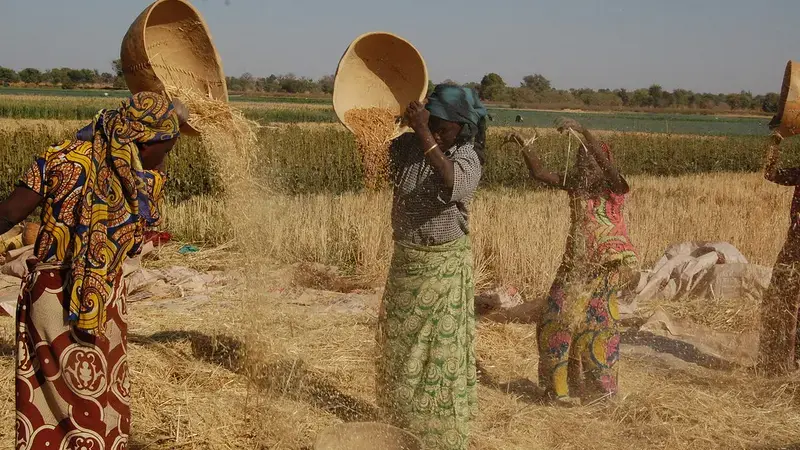Realizing the potential of rural women and youth

As men increasingly pursue more lucrative opportunities in industrial and service sectors, agriculture is experiencing a process of ‘feminization’ across much of the developing world. Estimates suggest some 43 per cent of agricultural workers worldwide are now women, and in some regions this figure can be much higher. In the Middle East and North Africa, for instance, socio-economic changes mean that women now comprise a 60 per cent share of the region’s agricultural workforce.
Despite this, gender inequality remains a recurring feature of agricultural production systems. Women are often delegated vulnerable work which is unpaid, casual, or temporary; they are forced to take on additional burdens such as childcare and domestic responsibilities; and they face financial, cultural, and legal constraints which can limit their access to knowledge, innovation, finance, markets, and resources.
Targeting gender inequities and empowerment
The limited availability of sex-disaggregated data means it is often difficult to address gender gaps and inequities. ICARDA research identifies how gender gaps constrain equitable development. We adopt rigorous, mixed method approaches, involving surveys, interviews, and sex-segregated focus groups; and we propose transformative gender-responsive strategies to increase agricultural production, incomes, and food security – while taking into consideration new and emerging climate scenarios (most recently, for example, in Tunisia, Morocco and Egypt).
A priority focus is enhancing women’s access to knowledge and innovation, and to productive resources such as land, water, seeds and credit. Since their labour is the most important asset they often have to offer studies also emphasise the importance of employment rights and practices.
Additionally, ICARDA explores formal and informal institutional arrangements that strengthen the voice of women. A series of studies in Egypt identified measures to enhance women’s participation in local governance and agricultural production: land ownership, access to education and training opportunities, and increased support from government, donors, and NGOs.
Another examined shifting conditions in rural communities and their effects on inclusion and gender equity. A relaxation of social norms, investments in infrastructure, growing markets, and male out-migration were all identified as factors that allowed women to assume more rewarding roles previously confined to men, such as marketing and participation in local governance.
The Center also promotes practical and cost-effective technologies that reduce the drudgery of agricultural work, and supports women to engage in more lucrative economic activities through agricultural diversification, intensification, and value-addition, providing capacity strengthening opportunities and encouraging women to become entrepreneurs.
Action on the ground to support rural women
In recent years ICARDA initiatives have continued to demonstrate impacts across the dry areas – from Central Asia to the Middle East and sub-Saharan Africa. Impacts have been felt in post-conflict Afghanistan, for instance, where a practical outreach strategy that included male community leaders helped the Center overcome pervading cultural norms to appoint female facilitators who led workshops and trainings that eventually reached over 10,000 women. The approach has now been adopted by leading non-governmental organizations such as CARE and the Aga Khan Foundation.
A wheat initiative managed by ICARDA and supported by the African Development Bank and the CGIAR Research program on Wheat has enhanced women’s productivity in Sudan, Nigeria, and Ethiopia. Capacity strengthening and enhancing women’s access to new innovations and technologies has increased incomes, reduced workloads, and strengthened decision-making power.
In Central Asia, ICARDA adopted a community-based breeding and market-driven approach to improve sheep and goat productivity and set-up a self-sustaining value chain, linking livestock producers and rural women in Central Asia to the world’s luxury yarn markets. The project eventually won an IFAD gender award.
Finally, in Ethiopia, women are at the front and center of an initiative promoting fuel-efficient stoves. Their adoption is not only slowing deforestation rates but also bringing multiple benefits for women and their wider communities: income-generating opportunities, reduced workloads, and improved respiratory health.
Addressing the needs of rural youth
Our research efforts also target another marginalized group – rural youth. Countries within the dry areas of the developing world have some of the highest rates of youth unemployment worldwide – representing not only a wasted opportunity to harness the talent and energy of this demographic group but also a potential contributor to regional instability and extremism as aspiration gives way to frustration and despair.
Could the solution lie within the agricultural sector? A study examining youth involvement in agriculture reveals that young men, contrary to popular belief, are interested in agriculture if it involves profitable production. Targeted investments in high-value commercial agriculture, then, or efforts to strengthen the entrepreneurial skills of young people could be options for kick-starting a youth-led agricultural transformation across the dry areas.
